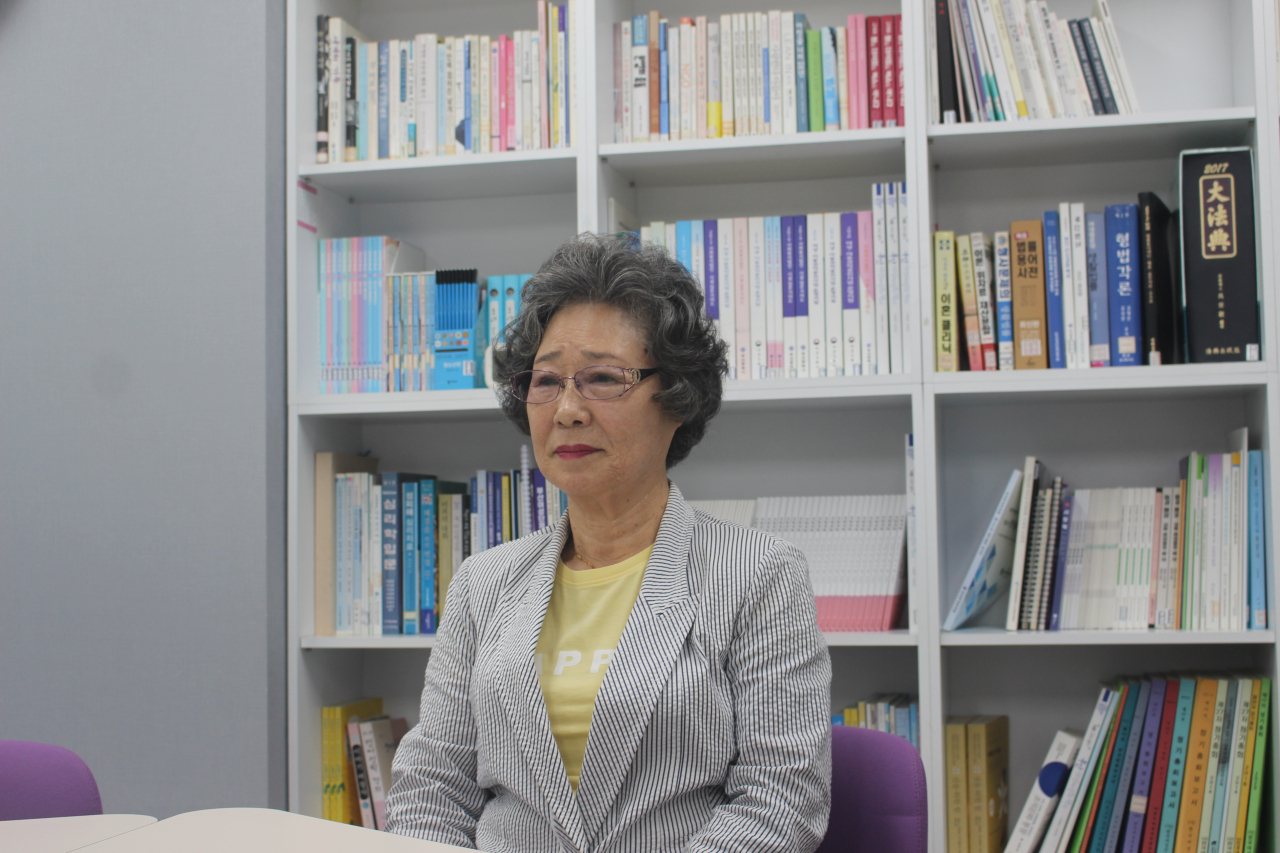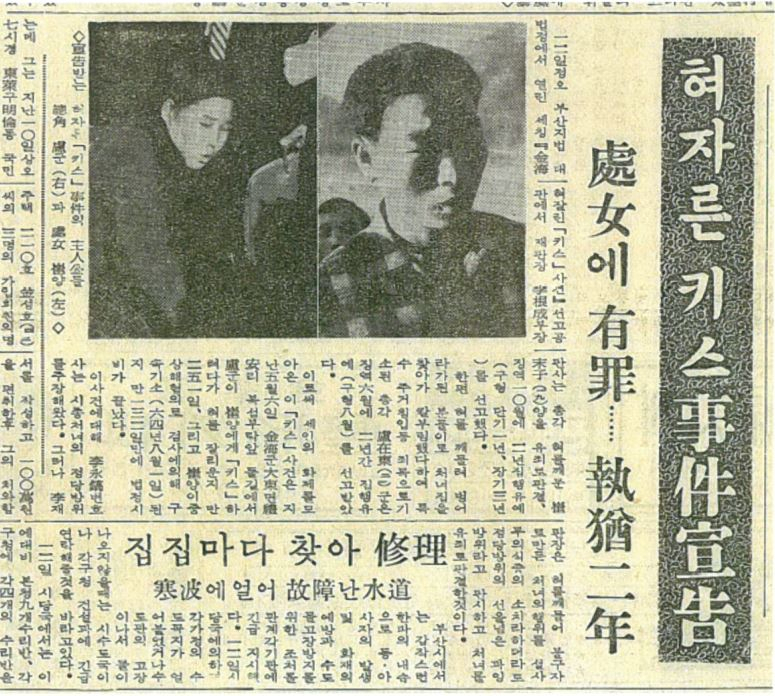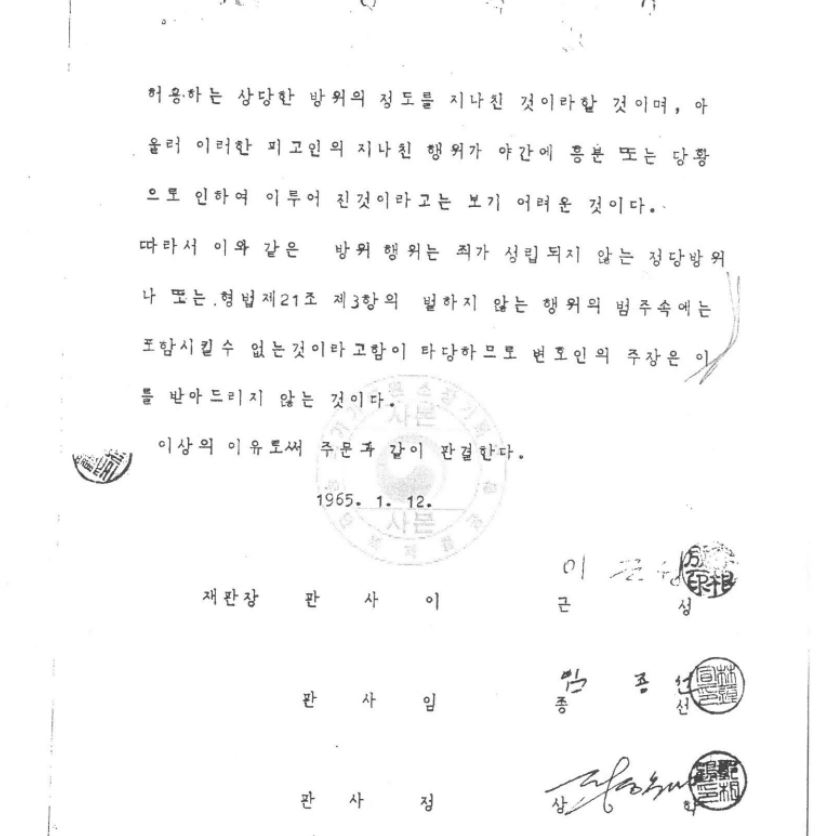[Herald Interview] 56 years overdue: Victim of 1964 sexual assault seeks justice
Choi fights for a retrial, vindication after being jailed for biting off the tongue of the man who tried to rape her
By Yoon Min-sikPublished : June 13, 2023 - 16:45

Ever since one fateful night in the spring of 1964, Choi Mal-ja has endured the weight of her notorious reputation as a “tongue biter" who supposedly ruined a young man’s life over a kiss.
At age 18, Choi bit off part of the man’s tongue as she tried to fight off an attempted rape. From today’s perspective, the nature of her actions is of little debate: It was self-defense.
But the world was a different place back then.
“The court made me -- the victim -- the attacker. I knew nothing about the law, but I knew that I had been wronged,” Choi, now 77, told The Korea Herald on June 5 in Busan, where she lives.
Eight months after the incident, she was sentenced to 10 months in prison, suspended for two years, while her attacker received six months in prison, suspended for one year. His sentence was not for the sexual assault, but for breaking into her home and threatening her after the incident. He was not even indicted for what he did to her on that night.
In May 2020, Choi filed for a retrial, seeking justice, which had failed her 56 years ago. Two lower courts have dismissed her case.
Now, she awaits the decision of the Supreme Court.
Victim accused
It is still painful to recall May 6, 1964, and the ensuing ordeal of investigations, six months of detention, relentless media scrutiny and the stigma attached to her name, Choi said.
Amid the whirlwind of events, it was the man's severed tongue that garnered all the attention and significance, not his sexual assault of her. In the aftermath, she was labeled the attacker, not the victim.
On Aug. 31 of that year, she was arrested and taken to a detention center, where she would spend the next six months of her life sleeping next to the toilet while being investigated by the prosecution.
The prosecutor who handled her case had cursed at her and berated her to “tell the truth,” she said, while disregarding the assault.
“I said I did nothing wrong, and (the prosecutor) said if I didn’t comply, I would have to spend the rest of my life in jail.
“(The prosecutor), calling me names, told me ‘Why won’t you take responsibility after crippling a man? Why won’t you marry him? Why won’t you compensate him?’”
“I maintained that if I had done something wrong, I would rather spend the time (in prison). I wasn’t going to pay him a dime.”
She found out only much later that her father had sold a portion of the family’s property to settle with the man in order to receive leniency from the court.
Choi's family endured persistent harassment from the man, surnamed Noh, who continually demanded compensation for his injury. He, accompanied by a few of his friends, even broke into their home and threatened Choi and her older sister with a knife, for which he received the suspended jail term.
“He was accusing me of not taking responsibility for making him disabled, brandishing a knife. My father wasn’t home, so we crouched next to the door (inside a room), terrified and holding onto the doorknob.”
Noh’s family initially requested 200,000 won, at a time when the lowest-ranking government official was taking home a little over 10,000 won per month. They eventually settled for 46,000 won.
Failed justice and secondary victimization
While Noh was the one responsible, Choi stressed that the state prosecutors and the judges who handled her case were “virtually accomplices” in putting the blame on her, the true victim.
Although most of the people related to the case have passed away, clippings of news stories at the time and the 1965 court verdict, acquired by The Korea Herald, show the pure absurdity, misogyny and secondary victimization that Choi was subjected to at that time.

A Dec. 18, 1964 story in the Busan Ilbo told how the court requested a psychologist to consult about the “psychology of a virgin woman when she first kisses a man,” to determine whether Choi’s statement aligned with the behavior and characteristics expected of a virgin, as she had claimed to be.
An unnamed psychologist cited in a Kookje Shinmun article said that Choi biting the man’s tongue was “a result of a hysterical reaction” that came from a conflict of curiosity toward man and the instinct to protect herself.
The same paper on Oct. 21 that year reported that Choi was asked by the court if she had any intention to marry Noh, as suggested by his family.
Another Busan Ilbo article showed that Choi’s lawyer -- while claiming self-defense on the part of his client -- suggested that he himself would actively arrange a marriage between the two, since social norms would prevent either of them from marrying other people. The speech got a round of applause from those in court, the article reports.
Absurdity reached its pinnacle in the court's verdict, which stated that because Choi willingly followed Noh, whom she had never met before, on an invitation for a short walk, this could be “seen as a result of her curiosity toward the man, as she is in puberty,” which supposedly would have caused Noh to incorrectly assume that she could have been into him.
Therefore, Choi was “morally responsible in part” for Noh’s actions, the verdict continued.

While acknowledging that Noh used force to open Choi’s mouth against her will, the verdict states that Choi’s response did not fall under the category of self-defense since he had not restrained her movement completely.
#MeToo, 56 years overdue
Throughout her life, two things about her past have ailed her. The first was the incident and the second was not being educated beyond elementary school.
Choi restarted her education in the late 2000s, which led her to enroll at the Korea National Open University in 2013. Eventually, she came across something that brought back dark memories from her past.
“There was a class titled ‘Sex, love and society,’ the content of which included sexual assault, domestic violence, human rights and gender equality,” she said. “Taking the class, it hit me: I was the victim of a sexual assault and attempted rape.
“I had always wanted to tell my story to someone, a famous storywriter, perhaps, but I had no perspective on what happened. (In the class) I learned about human rights and equality, and that I had the right to be protected,” she said. Choi went on to write a dissertation on the topic, and for a case study, she looked deeper into her own case.
Then, there came the #MeToo movement in late 2017 and 2018.
“I was hyped up, emotional. I was determined that society should not be this way and that I should contribute to (changing it)," she said.
With assistance from activists from the Korea Women’s Hot-Line, a local group supporting victims of sexual violence and domestic violence, Choi filed for a retrial in 2020.
So far, two courts have dismissed her requests on the grounds that an old court ruling cannot be reversed, even if it is wrong from today’s perspective.
The High Court, in 2021, however, clearly stated that she would not have been imprisoned if the case had happened today.
“If gender equality had been widely accepted (back in 1965) as an important virtue as it is today, and if deeply rooted and systematic gender discrimination had been less (severe), as it is today, we can say the applicant (Choi) would not have been sent to jail nor labeled the attacker,” it said.
“But the applicant’s indictment and trial occurred half a century ago in a different sociocultural context than today. We cannot overturn a past case just because times have changed,” it went on to say.
The Supreme Court should decide differently, Choi said, “If the Korean legal system is just and equal, as it claims.”
It was the court that turned a victim into the assailant. The court should correct its wrong, she stressed.
On her quest for justice, Choi has become a campaigner herself for the #MeToo movement and victims' rights in sexual harassment cases.
She doesn’t want to see the victims of sexual crimes endure what she had to go through.
“That is why I keep fighting ... There must be more victims among the younger generation who are afraid to come forward," she said.
“(The victims) should not have to bear the pain alone. It will not solve anything. They should reach out and consult others to get help.”






![[Weekender] How DDP emerged as an icon of Seoul](http://res.heraldm.com/phpwas/restmb_idxmake.php?idx=644&simg=/content/image/2024/04/25/20240425050915_0.jpg&u=)



![[Music in drama] An ode to childhood trauma](http://res.heraldm.com/phpwas/restmb_idxmake.php?idx=644&simg=/content/image/2024/04/25/20240425050929_0.jpg&u=)







![[Herald Interview] Mistakes turn into blessings in street performance, director says](http://res.heraldm.com/phpwas/restmb_idxmake.php?idx=652&simg=/content/image/2024/04/28/20240428050150_0.jpg&u=20240428174656)
